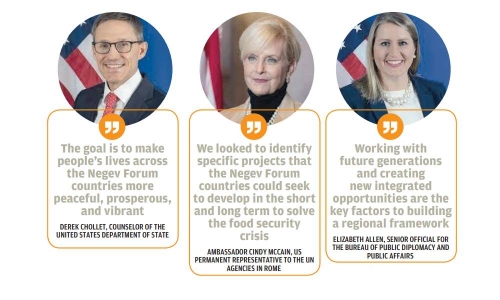Common goal for ‘more peaceful, prosperous and vibrant countries’
TDT | Manama
The Daily Tribune – www.newsofbahrain.com
Reported by Julia Cassano
For the past two days, US senior officials and partners from the governments of Bahrain, Egypt, Israel, Morocco, and the UAE discussed ways to build a regional framework in the Middle East and North Africa.
Derek Chollet, Counselor of the United States Department of State, said: “There were around 150 officials representing the different countries during the meetings, and it was the largest meeting between Israel and its regional partners since the Madrid summit in 1991.”
The briefing held yesterday is a direct follow on to the initial Negev summit held in March 2022 in Israel. “The Negev Forum created six working groups that met over the past two days which focused on core themes of the Negev process including regional security, clean energy, food and water security, health, tourism, and education,” said Counselor Chollet.
He stated that during sessions held with partners, they continued to pursue the overall goal of advancing coordinated initiatives that will encourage regional integration, cooperation, and development for the benefit of all people of the region.
“We are focused on producing tangible outcomes to strengthen the Palestinian economy and improve the quality of life for Palestinian people. We aimed to develop clear, concrete, and pragmatic steps to bolster integration and help augment the region’s security, peace, and economic prosperity,” said Counselor Chollet.
The US sent a large delegation to the meetings, including senior officials from eight US government agencies and were able to fully engage with a range of expertise whilst in discussion with partners in Bahrain, Egypt, Morocco, UAE, and Israel.
“The progress of the Negev Forum will build notable benefits within the region that have developed since the signing of the Abraham Accords and related agreements over two years ago,” said Counselor Chollet.
He highlighted the numerous regional benefits, including the vastly expanding trade, economic relationships, surges in tourism, cultural and academic exchanges, and more advanced coordination.
“The goal is to make people’s lives across the Negev Forum countries more peaceful, prosperous, and vibrant.” Ambassador Cindy McCain, US Permanent Representative to the UN Agencies in Rome, discussed how food and water security are the most important global security issues of our time.
“The situation has worsened because of Putin’s war in Ukraine, compounded with the Covid-19 pandemic, climate change, and regional conflicts. We need a united global effort to save lives and to tackle the root of hunger,” Ambassador McCain said.
Ambassador McCain further explained that investing in science, technology, and innovation is key to creating efficient food systems for the future. “We looked to identify specific projects that the Negev Forum countries could seek to develop in the short and long term to solve the food security crisis.”
Elizabeth Allen, Senior Official for the Bureau of Public Diplomacy and Public Affairs, commented on the goal to build a regional framework that can potentially change the Middle East’s and north Africa’s future.
“We had multiple sessions of constructed dialogue throughout the two days. Working with future generations and creating new integrated opportunities are the key factors to building a regional framework.”
She added that these opportunities could grow people-to-people ties in the region and promote a stronger sense of coexistence. Increased educational exchanges and coordination have a strong track record of creating jobs which positively impact economies.
“We have seen areas thrive since the Abraham Accords were signed years ago. We have seen several signs of memorandums of understanding between universities in Arab countries and Israel and opportunities for youth from different countries to engage with each other in cultural and sporting events.”
During the last two days, we have discussed opportunities to build on current work in academic cooperation, cultural exchange, sports, and media. Allen noted that they are at the beginning stage of the work and that their work is a long-term dialogue in which they are committed to creating a regional framework.
Related Posts

